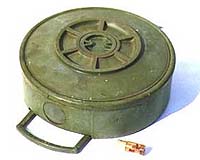 |
Paris (UPI) Jan 19, 2011 Saudi Arabia, leader of the Organization of Petroleum Exporting Countries, is discreetly boosting oil production as prices nudge $100 a barrel, the International Energy Agency reports amid growing unrest triggered by mounting fuel and food prices in Arab states. However, Saudi Arabia and other OPEC members have indicated that they see no reason to increase output to curtail prices that the IEA says threaten to derail a fragile economic recovery among developed nations this year. Despite the rising prices, OPEC left its official production levels unchanged at a meeting of the cartel in Ecuador in December. Saudi Oil Minister Ali Al-Naimi said that the time he favored an oil price of "$70 to $80 a barrel" and there were no plans to convene an extraordinary meeting before June 2. But the IEA, which advises 28 industrialized countries on energy policy, reported Tuesday that Saudi Arabia, the world's largest oil producer, has been quietly raising output over the last six months. Iraq, Kuwait and the United Arab Emirates, along with Saudi Arabia, had reduced official selling prices to make oil exports "more attractive," the IEA said. The kingdom's December output was pegged at 8.6 million barrels a day, 100,000 bpd more than a revised November estimate of 8.5 million bpd, the agency said. That was well above most market watchers' estimates, the Financial Times reported. The IEA said "preliminary market data" indicated Riyadh "is on track to increase production again in January." There was no indication that the production increases were linked to recent street protests in Arab states over economic conditions such as those that led to the downfall of President Zine el-Abidine Ben Ali of Tunisia on Jan. 14, ending 23 years of one-man rule in the North African state. But the worsening economic fallout from steadily rising oil prices over the last few weeks has intensified popular unrest across the Middle East and elsewhere. IEA Chief Economist Fatih Birol told the Financial Times last week that rising oil prices were "entering a dangerous zone for the global economy. The oil import bills are becoming a threat to the economic recovery. "This is a wake-up call to the oil-consuming countries and to the oil producers," he said. Over the past year, the oil import costs for the 34 countries that comprise the Organization of Economic Cooperation and Development soared by $200 billion to $970 billion at the end of 2010, an IEA analysis indicates. OECD members account for around 65 percent of all global oil imports. "Oil exporters need clients with healthy economies but these high prices will sooner or later make the economies sick, which would mean the need for importing oil will be less," Birol observed. The IEA said that OPEC production, including Iraq, rose in December by 250,000 bpd to 29.6 million bpd, the highest level since December 2008. Output is still well below the peak of nearly 32 million bpd set in July 2008, when oil prices hit a record high of $147 a barrel. At that time, OPEC's 12 members were pumping as much oil as they could. Three years later, the cartel has a spare production capacity of 5 million bpd. Most of this is controlled by Saudi Arabia, the United Arab Emirates and Kuwait, which are dovish on prices. Angola and Libya, which take a harder line and prefer high prices, also have spare capacity. When oil prices moved toward $100 a barrel in 2008, OPEC wasn't able to staunch the price spiral. Now, the Saudis at least are apparently taking action -- however discreetly -- to cool down the market to meet increased demand and curb the inflationary trend. The IEA, run by oil consumers, has often clashed with OPEC, a producers' cartel. They are currently at odds over prices and the need for higher production to spur global recovery. OPEC Tuesday blamed the rise in prices on speculation on oil futures and a weak U.S. dollar, while insisting that current oil supply is more than adequate. The IEA said OPEC needs to pump 400,000 bpd more than expected this year to balance the market, while the cartel says it only needs to boost output by 160,000 bpd.
Share This Article With Planet Earth
Related Links Powering The World in the 21st Century at Energy-Daily.com
 New funds go into clearing Falklands mines
New funds go into clearing Falklands minesStanley, Falkland Islands (UPI) Jan 18, 2011 New funds have gone into clearing mines planted on the Falkland Islands by Argentine forces during the 1982 conflict with Britain that cost more than 1,000 lives and left a legacy of deadly ordnance in some of the most popular pubic sights on the territories. Officials said funds from the British government would allow the de-mining operation to begin this year after evaluation visits b ... read more |
|
| The content herein, unless otherwise known to be public domain, are Copyright 1995-2010 - SpaceDaily. AFP and UPI Wire Stories are copyright Agence France-Presse and United Press International. ESA Portal Reports are copyright European Space Agency. All NASA sourced material is public domain. Additional copyrights may apply in whole or part to other bona fide parties. Advertising does not imply endorsement,agreement or approval of any opinions, statements or information provided by SpaceDaily on any Web page published or hosted by SpaceDaily. Privacy Statement |